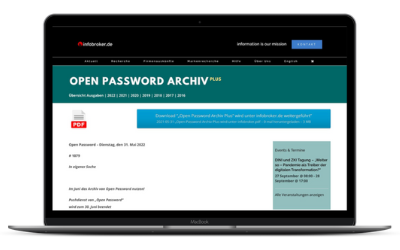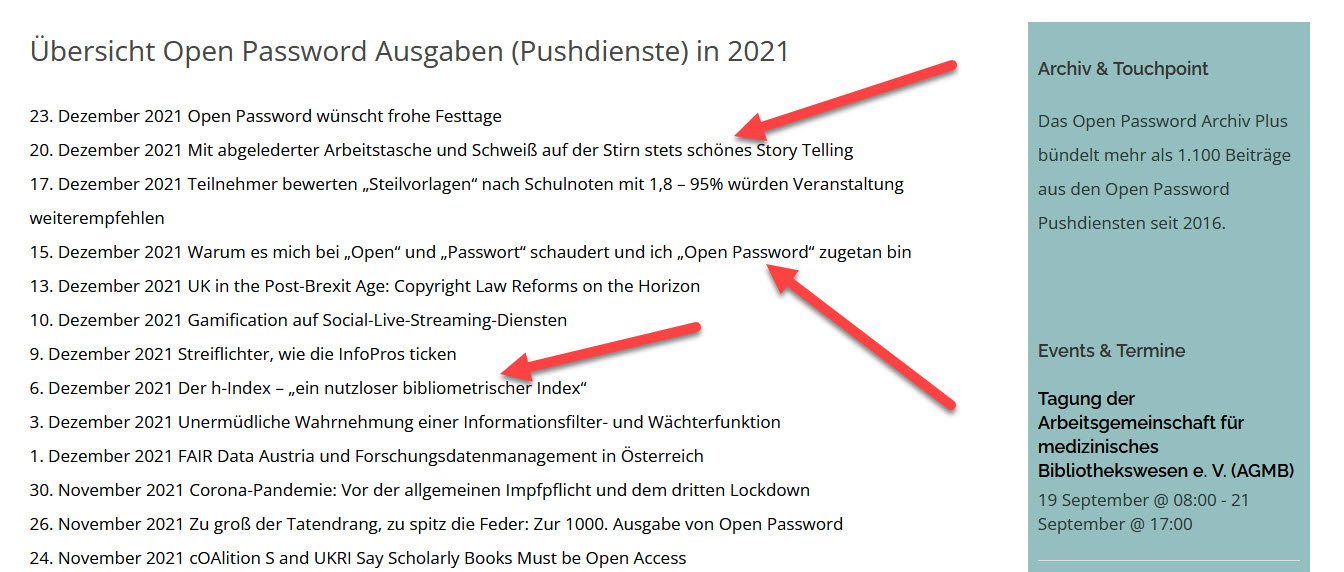Open Password – Mittwoch,
den 14. Oktober 2020
# 838
Dun & Bradstreet – Bisnode – Continental Europe -Anthony Jabbour – Neeraj Sahai –
Universität Hildesheim – Digitale Lebenswelten – Wandel der Universität – Joachim Griesbaum – Outsell – Springer Nature – ResearchGate – Tatiana Khayrullina – Syndication Partnership – BMI – IEEE – Taylor and Francis – Researcher – Hindawi – Emerald – Kudos – Cactus – Metrics – Life Sciences – Active Maintenance – Sign-up Filter
Dun & Bradstreet Acquires Bisnode
Dun & Bradstreet Re-enters Continental Europe
with the Acquisition of Bisnode
In 2003 Dun & Bradstreet sold all of its continental subsidiaries to Bisnode. Bisnode became Dun & Bradstreet’s Franchise. Dun & Bradstreet Holdings, Inc. announced that it has entered into a definitive agreement to purchase the outstanding shares of Bisnode Business Information Group AB (“Bisnode”), a leading European data and analytics firm and long-standing member of the Dun & Bradstreet Worldwide Network. The estimated purchase price upon closing is 7.2B SEK or approximately $818 million USD.The transaction is expected to close in January 2021, subject to required regulatory approvals and customary closing conditions.
“We are pleased to bring Bisnode into the Dun & Bradstreet family following a nearly two-decade strategic alliance,” said Anthony Jabbour, Chief Executive Officer at Dun & Bradstreet. “The powerful combination of our data, analytics and innovative solutions, paired with Bisnode’s deep client relationships and expertise in European markets will provide our existing and future clients with vital business intelligence to support their own growth ambitions. We look forward to welcoming the Bisnode team to Dun &Bradstreet and to working together to grow the global business.”
As Dun & Bradstreet unites the two complementary organizations after a successful 17-year alliance, it builds on the strong foundations of the relationship to deliver numerous strategic benefits that align to the Company’s previously stated growth objectives:
- The acquisition positions Dun & Bradstreet to rapidly expand across the Scandinavian, DACH (Germany, Austria and Switzerland) and central European countries.
- Upon transaction close, Dun & Bradstreet will add over 110,000 Bisnode customers to its client base, ranging from small businesses to large enterprises, including having direct access to nearly 50 Global 500 companies headquartered in Bisnode territories.
- The deal provides direct access to Bisnode’s 33 million records from 550+ sources throughout Europe, contributing to the scale, depth, diversity and accuracy of the Company’s constantly expanding Data Cloud that contains comprehensive information on more than 360 million total businesses.
- Upon transaction close, the Company plans to rapidly introduce its modern Finance & Risk and Sales & Marketing solutions at scale to clients across Europe, providing vital business intelligence to help them compete, thrive and grow.
“Integrating our two leading organizations provides significant opportunity to deliver a broader product set to a substantially larger global client base. As the international business community becomes increasingly data-driven, we look forward to combining our teams to unlock further potential, drive innovation and deliver solutions that are tuned to client and market needs,” said Neeraj Sahai, President of Dun & Bradstreet International.Upon the close of the transaction and to further support its growth agenda, Dun & Bradstreet will establish an International Strategic Advisory Board which will be led by Sahai with inclusion of Jonas Wiström, Chief Executive Officer for Ratos AB.
Digitale Lebenswelten: Wie verändert sich die Umwelt?
#8: Wie verändert sich Universität? (Wintersemester 2020/2021)
Hallo Herr Bredemeier,
das Programm für die aktuelle Saison der Digitalen Lebenswelten ist fertiggestellt und online.
Vielleicht ist es interessant, für Passwort darauf hinzuweisen. Zumindest der erste Termin ist sehr nah an die Informationswissenschaften, aber vielleicht sind auch die weiteren Termine interessant für die Leser von Password-Online.
Joachim Griesbaum, Universität Hildesheim
Programm der Reihe Digitale Lebenswelten 2020/2021 online!
Die Digitalen Lebenswelten sind ein etabliertes Format an der Universität Hildesheim. Bei der Reihe handelt es sich um eine fachbereichsübergreifende Kooperation und um einen Ansatz zur stärkeren Vernetzung der Universität mit der Hildesheimer sowie der regionalen Öffentlichkeit.
Das Programm für die aktuelle Saison der Digitalen Lebenswelten ist online. Die leitende Fragestellung in diesem Winter lautet „Wie verändert sich Universität?“.
Die Vorträge und Diskussionen finden zur gewohnten Zeit statt – immer dienstags um 18.15 Uhr. Alle Veranstaltungen werden online durchgeführt. Hierzu nutzen wir das universitäre Videokonferenzsystem. Die URL ist https://bbb.uni-hildesheim.de/b/joa-nuq-if7-yyx. Zur Teilnahme rufen Sie einfach im Browser diese URL auf. Eine separate Software wird nicht benötigt.
Weitere Infos unter https://www.facebook.com/DigitaleLebenswelten
Das Programm:
- Oktober 2020
Informationskompetenz in der Corona-Zeit
Stefan Dreisiebner (Universität Graz), Tamara Heck (DIPF), Sylvia Jaki - November 2020
Digitales Lehren und Lernen
(gemeinsam veranstaltet mit dem Zentrum für Digitalen Wandel)
Sarah Ben Bornia, Ewald Brahms, Jörg Diederich, Guido Graf, Bernadette Spieler - November 2020
Technische Infrastruktur und Datenschutz
Jörg Diederich, Jana Göhe, Thomas Mandl - November 2020
Internene Kommunikation in der digitalen Transformation – Studienergebnisse und Ausblick
Katharina Krämer (ZHAW) - Dezember 2020
“Können Sie mich alle hören?” – Sprecherwechsel und multimodale Ressourcen in der Online-Lehre
Bettina Kluge - Januar 2021
Chancengleichheit
Per Holderberg, Silvia Lange, Amanda Steinmaus, Janna Teltemann - Januar 2021
Onboarding – Studien- und Arbeitsbeginn in Zeiten physischer Distanz
Mehrere angefragt
Outsell Contribution October
Springer Nature and ResearchGate
Demonstrate a Collaborative Path Forward
By Tatiana Khayrullina, Director & Lead Analyst
Informal content sharing tops the list of reasons why STM publishers are looking for alternative business models. While the search continues, some players are testing hybrid solutions, meeting the disruptors half-way.
___________________________________________________________________________
What to Know and Why It Matters
___________________________________________________________________________
Springer Nature and Research Gate will continue their syndication partnership, which started as a pilot in 2019. The extended scope of the partnership will include more Springer Nature journals syndicated directly to ResearchGate pages but will restrict access for non-authorized users to an enhanced abstract, which includes metadata, the abstract, figures and captions, and the full first page. Both parties were happy with the two-stage pilot results, reporting positive author feedback reaching 90% and increased usage of content syndicated to ResearchGate. The content was downloaded between 0.6% and 19.5% more across different journal titles, depending on the discipline.
Springer Nature emphasizes the increased visibility of the usage of its content for libraries as one of the benefits of the agreement. Both the publisher and the libraries have a better idea of how and when ResearchGate members access and share the content. Most of these members have an affiliation with an academic institution, and many have a subscription to Springer Nature. For authors in the latter group, the experience of using ResearchGate now includes their articles published by Springer Nature being automatically added to their ResearchGate profiles and connected with the rest of their content, for access on- and off-campus. The long-term partnership highlights the benefits of holding a subscription to Springer Nature content and encourages responsible sharing. However, the last word on this sensitive issue is left to the author.
___________________________________________________________________________
Analyst Rating: Positive
___________________________________________________________________________
We have talked extensively about the pressing need for publishers to turn their content from being an end in itself into an incentive to form a vibrant user community. Many publishers have embraced the idea of following their audiences where they want to go. A few recent examples include like BMJ and IEEE launching pre-prints, Taylor and Francis collaborating with the aggregator Researcher, Hindawi partnering with a pool of author service providers, and Emerald opting for shareable PDFs with Kudos.
Typically, the objective of the initiatives described above is to direct user traffic toward the publisher platform, and that is a valid strategy. The Springer Nature and Research Gate partnership takes this idea further, into sharing the content outside the publisher platform but with the compensation of direct access to the user data, collected and structured by ResearchGate. There is also an important bonus in a cross-publisher recommendation engine — one of the main attractions of ResearchGate — that now picks the content irrespective of the author’s decision to upload and share it. Multiplied by 17 million users of the ResearchGate platform, these seemingly marginal improvements translate into substantial growth in usage for Springer Nature along with better familiarity with its user base.
___________________________________________________________________________
Recommended Actions for Springer Nature
___________________________________________________________________________
Scientists value Research Gate for providing the chance to promote their work and build equity in the academic community. A connection to a set of tools like the ones offered by Kudos or Impact Science by Cactus will help advance the message further and work toward Springer Nature and ResearchGate’s common goal of making the researcher’s life easier. Further down the road, Springer Nature may want to rely on the data feed of the social activity generated by its publications to understand its ultimate impact, as the industry is looking for a holistic set of metrics for scholarly publishing.
___________________________________________________________________________
Recommended Competitor Action
___________________________________________________________________________
The route that Springer Nature has taken is open to all publishers, and ResearchGate will welcome more syndication partners. Note the measured approach here, and the time it took Springer Nature to commit to a long-term partnership, which both emphasize that it is a risky experiment that may not work. A collaboration with ResearchGate will suit a publisher with a focus in Life Sciences like the AMA or NEJM. Such a move would provide a glimpse into the challenges and the benefits of managing a user community without the need to build and nurture a proprietary one on an organization’s own platform.
___________________________________________________________________________
Essential Actions
___________________________________________________________________________
A thriving digital publishing business needs engaged users. There are many building blocks to architecting a vibrant user community, the critical ones being the incentive for potential community members to come together and the technology supporting the community’s activities once it is formed. Associations, standards developers, and society publishers will find themselves in a privileged position regarding the common mission of their members, and larger and more diversified publishers may be better equipped from a technology perspective. However, here are a few thoughts for all players in the data, information, and analytics marketplace to consider:
- All communities need active maintenance. Members must see a clear reason to engage, or the community will not move past having a lot of passive content consumers. Active maintenance is the difference between the former and the latter.
- It is essential to observe security and privacy rules and regulations. We cannot overstate this aspect, and the implications will vary depending on the jurisdiction.
- A strict and clear filter at sign-up is the way to go. It sounds counterintuitive, but a community has a better chance of growth and longevity if it restricts access to qualified users.
.
Open Password
Forum und Nachrichten
für die Informationsbranche
im deutschsprachigen Raum
Neue Ausgaben von Open Password erscheinen viermal in der Woche.
Wer den E-Mai-Service kostenfrei abonnieren möchte – bitte unter www.password-online.de eintragen.
Die aktuelle Ausgabe von Open Password ist unmittelbar nach ihrem Erscheinen im Web abzurufen. www.password-online.de/archiv. Das gilt auch für alle früher erschienenen Ausgaben.
International Co-operation Partner:
Outsell (London)
Business Industry Information Association/BIIA (Hongkong)
Anzeige

FAQ + Hilfe



